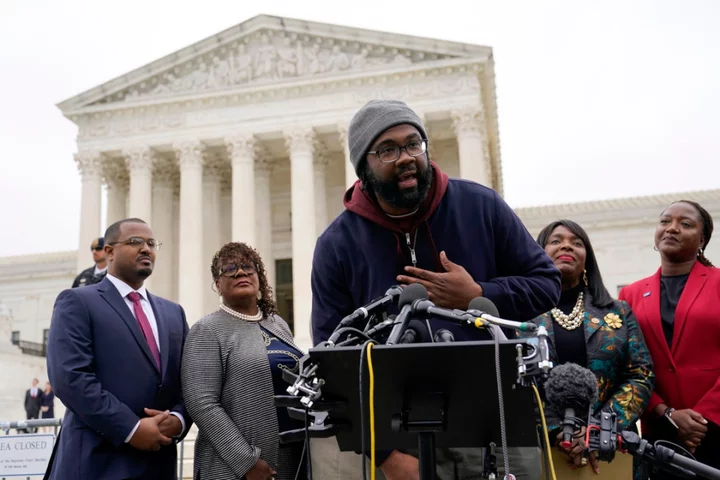Supreme Court rules Alabama discriminated against Black voters in major victory for voting rights
In a victory for voting rights and Alabama voters, the US Supreme Court has ruled that the state likely violated the Voting Rights Act with a congressional redistricting plan that diluted the voting power of Black voters. The state likely discriminated against Black voters with a newly drafted map that packs most of the state’s Black residents into a single district, out of seven, despite Black residents making up 27 per cent of the state’s population. A key ruling in the case of Allen v Milligan means that the state will have to re-draw its congressional map to include a second majority-Black district. The surprise 5-4 decision on the conservative-majority panel was written by Chief Justice John Roberts, joined by liberal Justices Elena Kagan, Ketanji Brown Jackson and Sonia Sotomayor, with partial but crucial concurrence from conservative Brett Kavanaugh. In January, a lower court determined that the map significantly dilutes Black residents’ political power and ordered the state to draw new political boundaries that would create at least two districts in which Black voters would be more likely to elect a representative that more closely resembles the state’s demographics. The Voting Rights Act was drafted to prevent that kind of race-based dilution of Black voters. But attorneys for the state argued the opposite – that considering race to redraw political boundaries would mark an unconstitutional consideration of “racial targets” and “race-based sorting”, in violation of the 14th Amendment’s equal protection clause. A decision that sided with Alabama attorneys would have radically reduced Black voters’ political power and landed a critical blow to a state with a long history of racist violence and discrimination. Section 2 of the Voting Rights Act prohibits voting laws and election policies from discriminating on the basis of race. The state’s suggestion that “race should play no role whatsoever” to determine whether redistricting plans violate Section 2 would “rewrite” the law and “overturn decades of settled precedent,” according to the map’s challengers. Attorneys for President Joe Biden’s administration argue that Section 2 of the Voting Rights Act should be considered when “pervasive racial politics would otherwise deny minority voters equal electoral opportunities.” The map’s challengers argued that is precisely what is at stake in Alabama. This is a developing story Read More Main suspect in 2005 disappearance of Natalee Holloway due to be extradited to US Alabama senator says Space Command prefers Huntsville for HQ, but command has no comment Missouri governor signs ban on transgender health care, school sports
In a victory for voting rights and Alabama voters, the US Supreme Court has ruled that the state likely violated the Voting Rights Act with a congressional redistricting plan that diluted the voting power of Black voters.
The state likely discriminated against Black voters with a newly drafted map that packs most of the state’s Black residents into a single district, out of seven, despite Black residents making up 27 per cent of the state’s population.
A key ruling in the case of Allen v Milligan means that the state will have to re-draw its congressional map to include a second majority-Black district.
The surprise 5-4 decision on the conservative-majority panel was written by Chief Justice John Roberts, joined by liberal Justices Elena Kagan, Ketanji Brown Jackson and Sonia Sotomayor, with partial but crucial concurrence from conservative Brett Kavanaugh.
In January, a lower court determined that the map significantly dilutes Black residents’ political power and ordered the state to draw new political boundaries that would create at least two districts in which Black voters would be more likely to elect a representative that more closely resembles the state’s demographics.
The Voting Rights Act was drafted to prevent that kind of race-based dilution of Black voters. But attorneys for the state argued the opposite – that considering race to redraw political boundaries would mark an unconstitutional consideration of “racial targets” and “race-based sorting”, in violation of the 14th Amendment’s equal protection clause.
A decision that sided with Alabama attorneys would have radically reduced Black voters’ political power and landed a critical blow to a state with a long history of racist violence and discrimination.
Section 2 of the Voting Rights Act prohibits voting laws and election policies from discriminating on the basis of race. The state’s suggestion that “race should play no role whatsoever” to determine whether redistricting plans violate Section 2 would “rewrite” the law and “overturn decades of settled precedent,” according to the map’s challengers.
Attorneys for President Joe Biden’s administration argue that Section 2 of the Voting Rights Act should be considered when “pervasive racial politics would otherwise deny minority voters equal electoral opportunities.”
The map’s challengers argued that is precisely what is at stake in Alabama.
This is a developing story
Read More
Main suspect in 2005 disappearance of Natalee Holloway due to be extradited to US
Alabama senator says Space Command prefers Huntsville for HQ, but command has no comment
Missouri governor signs ban on transgender health care, school sports

